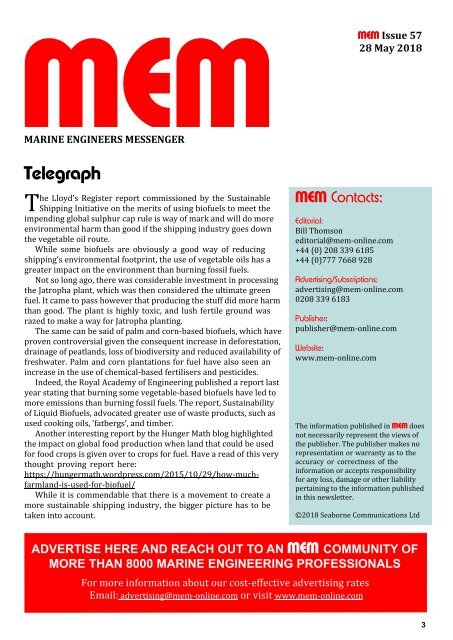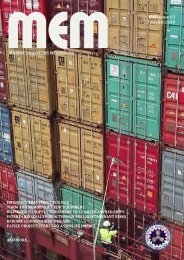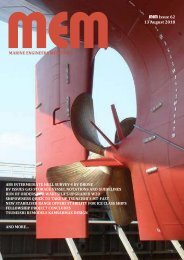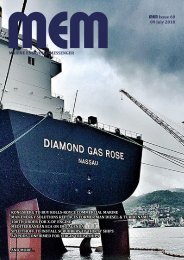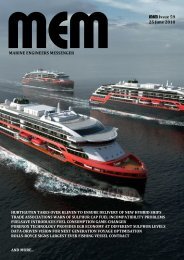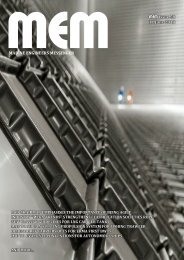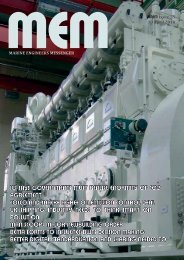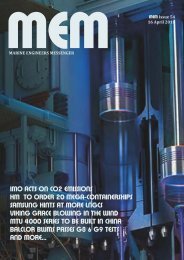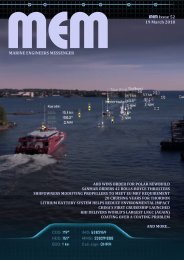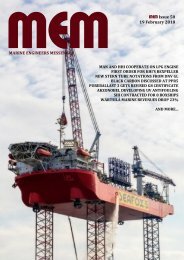MEM57
Marine Engineers Messenger, Volume 3 Issue 57.
Marine Engineers Messenger, Volume 3 Issue 57.
Create successful ePaper yourself
Turn your PDF publications into a flip-book with our unique Google optimized e-Paper software.
MEM<br />
MARINE ENGINEERS MESSENGER<br />
Telegraph<br />
The Lloyd’s Register report commissioned by the Sustainable<br />
Shipping Initiative on the merits of using biofuels to meet the<br />
impending global sulphur cap rule is way of mark and will do more<br />
environmental harm than good if the shipping industry goes down<br />
the vegetable oil route.<br />
While some biofuels are obviously a good way of reducing<br />
shipping’s environmental footprint, the use of vegetable oils has a<br />
greater impact on the environment than burning fossil fuels.<br />
Not so long ago, there was considerable investment in processing<br />
the Jatropha plant, which was then considered the ultimate green<br />
fuel. It came to pass however that producing the stuff did more harm<br />
than good. The plant is highly toxic, and lush fertile ground was<br />
razed to make a way for Jatropha planting.<br />
The same can be said of palm and corn-based biofuels, which have<br />
proven controversial given the consequent increase in deforestation,<br />
drainage of peatlands, loss of biodiversity and reduced availability of<br />
freshwater. Palm and corn plantations for fuel have also seen an<br />
increase in the use of chemical-based fertilisers and pesticides.<br />
Indeed, the Royal Academy of Engineering published a report last<br />
year stating that burning some vegetable-based biofuels have led to<br />
more emissions than burning fossil fuels. The report, Sustainability<br />
of Liquid Biofuels, advocated greater use of waste products, such as<br />
used cooking oils, ‘fatbergs’, and timber.<br />
Another interesting report by the Hunger Math blog highlighted<br />
the impact on global food production when land that could be used<br />
for food crops is given over to crops for fuel. Have a read of this very<br />
thought proving report here:<br />
https://hungermath.wordpress.com/2015/10/29/how-muchfarmland-is-used-for-biofuel/<br />
While it is commendable that there is a movement to create a<br />
more sustainable shipping industry, the bigger picture has to be<br />
taken into account.<br />
MEM Contacts:<br />
MEM Issue 57<br />
28 May 2018<br />
Editorial:<br />
Bill Thomson<br />
editorial@mem-online.com<br />
+44 (0) 208 339 6185<br />
+44 (0)777 7668 928<br />
Advertising/Subscriptions:<br />
advertising@mem-online.com<br />
0208 339 6183<br />
Publisher:<br />
publisher@mem-online.com<br />
Website:<br />
www.mem-online.com<br />
The information published in MEM does<br />
not necessarily represent the views of<br />
the publisher. The publisher makes no<br />
representation or warranty as to the<br />
accuracy or correctness of the<br />
information or accepts responsibility<br />
for any loss, damage or other liability<br />
pertaining to the information published<br />
in this newsletter.<br />
©2018 Seaborne Communications Ltd<br />
ADVERTISE HERE AND REACH OUT TO AN MEM COMMUNITY OF<br />
MORE THAN 8000 MARINE ENGINEERING PROFESSIONALS<br />
For more information about our cost-effective advertising rates<br />
Email: advertising@mem-online.com or visit www.mem-online.com<br />
3


